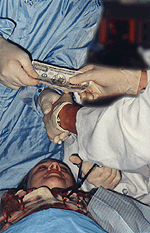Attitudes about donation

Of particular interest, in reading the literature generated to promote organ donation, including research as to why families or ethnic groups choose not to donate, are views by the researchers themselves about those who oppose organ donation or express trepidation. These people are frequently identified in the literature as people with a “lack of education,” who experience “distrust of the healthcare system.” They “fail to communicate” well with health care providers, are “apathetic,” and operate on “superstitious or religious beliefs.”
What is most frustrating then, is to see this cultural bias of a perceived elite group—those who promote transplants—as they express their views of people who raise very legitimate ethical questions about organ donation.
What follows is a general listing of group attitudes based upon an assumption of death by cessation of heart and respiration, or death as defined by “whole brain death” criteria.
Amish - The Amish do not donate organs for research. Individuals have consented to donation for transplant with particular recipients in mind.
Buddhism - Buddhists believe organ donation is a personal decision and should be left to an individual’s conscience.
Catholicism – Many Catholics view organ donation as an act of charity. Transplants are ethically and morally acceptable.
The Church of Christ Science - Christian Scientists rely on spiritual rather than medical means for healing. The Church opposes medical endeavors, including organ transplants and donation for research.
Gypsies - Gypsies, on the whole, are against organ donation. Although they have no formal resolution, their opposition is related to their belief about the afterlife. Gypsies believe that for one year after the person dies, the soul retraces its steps. All of the body parts must be intact because the soul maintains a physical shape.
Hinduism - Hindus are not prohibited by religious law from donating their organs. Donation is an individual decision.
Islam - In 1983, the Muslim Religious Council initially rejected organ donation, but it has now reversed its position. Muslims believe that human remains should be kept intact. However, organ donation is permitted because saving lives is a priority. As long as certain conditions are met, transplantation is not forbidden.
Jehovah’s Witnesses - According to the Watch Tower Society, the legal corporation for the religion, Jehovah’s Witnesses do not encourage organ donation, but believe it is a matter best left to an individual’s conscience. Jehovah’s Witnesses may receive a transplant but organs and tissues must be completely drained of blood before transplantation. This is because of a literal interpretation of a Scripture that states that “the life is in the blood.”
Judaism - Judaism teaches that saving a life takes precedence over maintaining the sanctity of the human body. Although the dead should not be “mutilated” or their burial deferred, exceptions are made for organ donation.
Mormons - The Church of Jesus Christ of Latter-day Saints considers the decision to donate organs a personal one. Mormons must individually weigh the advantages and disadvantages of transplantation and choose the one that will bring them peace and comfort.
Protestantism - The Protestant faith respects individual choice and a person’s right to make decisions regarding his or her own body or the body of a family member in extremis. However, when researching the Protestant or Evangelical position, beware of promotional literature which pulls Scripture out of context to imply that organ donation is directly endorsed by Jesus Christ.
For example, one source notes that, “Protestants believe that Jesus Christ came to give life and to give it in abundance. Organ donations enable more abundant life, alleviate pain and suffering, and express love in times of tragedy.”
The result is that a Scripture intended to speak of spiritual abundance through faith has been transformed to imply a reference to physical well being.
Conclusion:
Organ donation is generally viewed as an act of altruism. But the act of donating is never to be at the expense of prematurely ending the life of the donor. As new definitions are constructed for death, definitions intended to result in a greater number of potential organs being made available, individuals need to examine the manner in which death is determined.
Whose body is it anyway?
Language of the transplant industry
Attitudes about donation
The age of "Already Dead"
The Wholesalers

